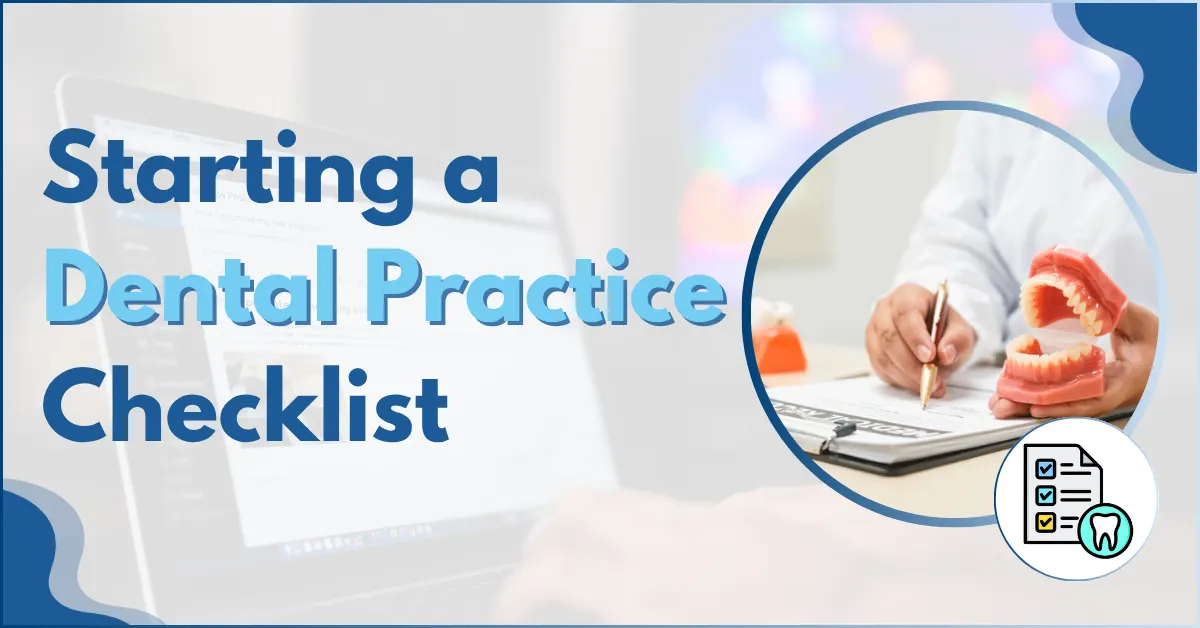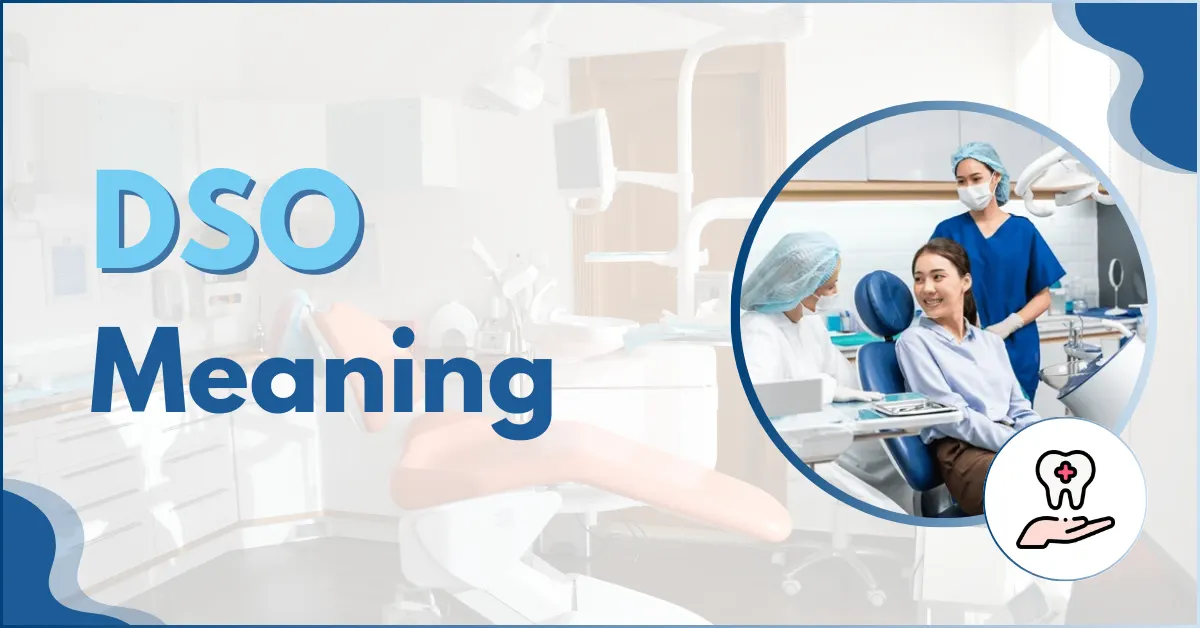Starting your own dental practice is exciting, but it is also a serious business decision. You are not just caring for patients, but creating a brand, managing operations, hiring people, handling money, and navigating legal rules.
But don’t worry. We have broken it all down for you in a friendly and straightforward way. You can also download a free New Dental Practice Checklist PDF to keep track of each step.
Starting a Dental Practice Checklist – Summarized
Here is a summarized table of the starting a dental office checklist
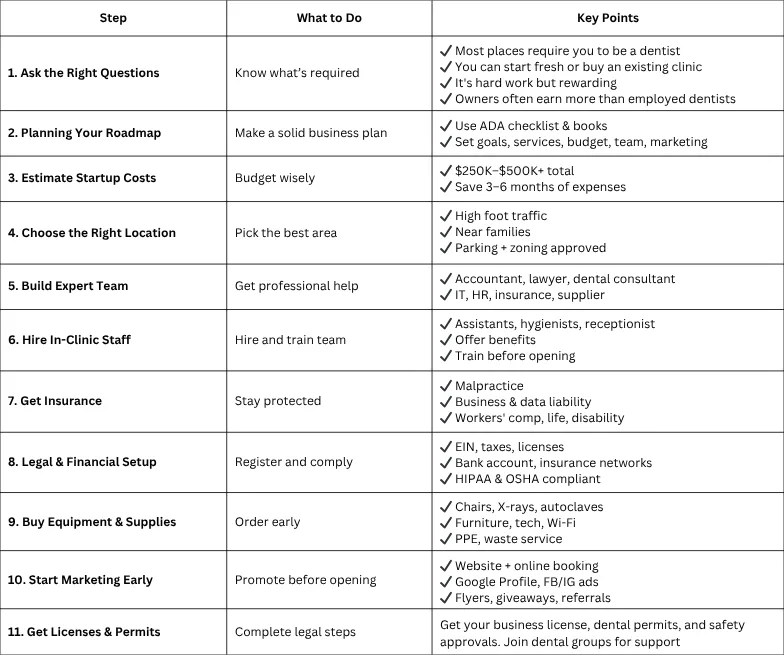
| Step | What to Do | Key Points |
| 1. Ask the Right Questions | Know what’s required | ✔ Most places require you to be a dentist✔ You can start fresh or buy an existing clinic✔ It’s hard work but rewarding✔ Owners often earn more than employed dentists |
| 2. Planning Your Roadmap | Make a solid business plan | ✔ Use ADA checklist & books✔ Set goals, services, budget, team, marketing |
| 3. Estimate Startup Costs | Budget wisely | ✔ $250K–$500K+ total✔ Save 3–6 months of expenses |
| 4. Choose the Right Location | Pick the best area | ✔ High foot traffic✔ Near families✔ Parking + zoning approved |
| 5. Build Expert Team | Get professional help | ✔ Accountant, lawyer, dental consultant✔ IT, HR, insurance, supplier |
| 6. Hire In-Clinic Staff | Hire and train team | ✔ Assistants, hygienists, receptionist✔ Offer benefits✔ Train before opening |
| 7. Get Insurance | Stay protected | ✔ Malpractice✔ Business & data liability✔ Workers’ comp, life, disability |
| 8. Legal & Financial Setup | Register and comply | ✔ EIN, taxes, licenses✔ Bank account, insurance networks✔ HIPAA & OSHA compliant |
| 9. Buy Equipment & Supplies | Order early | ✔ Chairs, X-rays, autoclaves✔ Furniture, tech, Wi-Fi✔ PPE, waste service |
| 10. Start Marketing Early | Promote before opening | ✔ Website + online booking✔ Google Profile, FB/IG ads✔ Flyers, giveaways, referrals |
11. Get Licenses & Permits | Complete legal steps | Get your business license, dental permits, and safety approvals. Join dental groups for support |
Starting a Dental Practice Checklist: 11 Important Steps
Let’s discuss each step in detail:
Step 1: Ask the Right Questions First
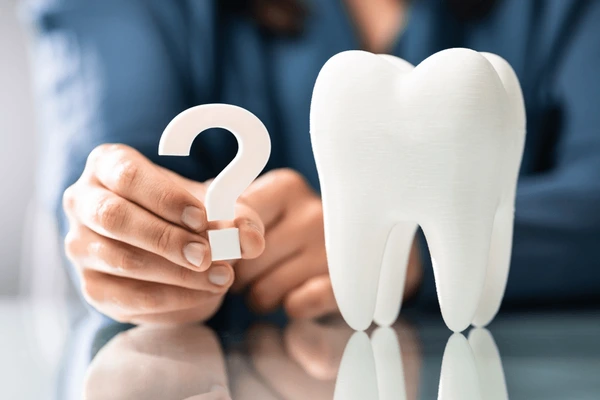
Do I need to be a dentist to open a dental office?
In most countries and U.S. states, yes, you need to be a licensed dentist. However, in some places, non-dentists can invest or co-own a dental practice if a licensed dentist is managing the clinical work.
If you are not a dentist, check local laws or consult a healthcare attorney. (Search: “Do I need to be a dentist to open a dental office in your location)
Should I start a new practice or buy an existing one?
Use our Buying a Dental Practice Checklist to compare both options side by side.
How hard is it to open a dental practice?
It’s challenging, but not impossible. You will perform many roles (dentist, manager, marketer). But once you are up and running, the results are worth it. With time and a loyal patient base, it becomes smoother and more profitable.
What is the salary for owning your own dental practice?
Once established, dental practice owners often earn significantly more than employed dentists. Your location, patient volume, and business management skills all play a big role in profitability.
Step 2: Create a Business Plan for Your Dental Clinic
Having a clear business plan is one of the best things you can do when starting your own dental practice. It gives you a clear path to follow and helps you stay focused.
A good business plan also makes it easier to get a loan or investment if you need money to start.
Your business plan should explain how you will start, run, and grow your clinic. It should also help you prepare for any problems you might face along the way.
Use resources like:
Your plan should include:
Step 3: Do Research About Your Local Market

Market research is a big part of planning your dental clinic. You need to understand the area where you want to open your office.
Here are some questions to ask:
If there is only one other dentist nearby, your plan will be different than if you open in an area with many competitors, including big dental companies.
Market research helps you see what makes your clinic special. It can also help you decide which services to offer to stand out.
Watch Out for DSO Competitors
In some areas, there are dental service organizations (DSOs). These are big companies that run many dental offices.
They often have large marketing budgets, which means they advertise a lot. This can make it harder for a new clinic like yours to attract new patients.
But these big clinics sometimes do not give personal or high-quality service. This creates a chance for your clinic to offer better care and win over unhappy patients who are looking for a more caring dentist.
Step 4: Estimate Startup Costs
There are many things that affect how much your new clinic will cost. Below is a breakdown to help you think through each important area.
Practice Size
The number of treatment rooms (called operatories) will have a big impact on your costs. More rooms mean more chairs, tools, and space. You may also need to hire more staff to manage a larger clinic.
Location Type
Where you open your clinic matters; Urban (city) locations usually have higher rent and more rules about how you can build or design your space. Rural (small town or village) locations often cost less to rent or buy, but it may cost more to ship equipment there or hire certain professionals.
New vs Used Equipment
New dental equipment gives you the latest technology and comes with warranties, but it can be expensive. Used equipment in good condition can save you a lot of money, especially when starting out.
Major Startup Costs to Include in Your Budget
When planning your budget, make sure to set aside money for these main areas:
Keep Extra Money for Monthly Expenses
Besides the money to open your clinic, it is a smart idea to have enough cash saved to cover about six months of regular expenses. It may take time to attract new patients and earn a steady income, so you’ll need money to keep your clinic running during that time.
Monthly Overhead Expenses to Expect
These are the main areas where your money will go each month:
Industry Insight About Cost
According to the American Dental Association, most dental clinics spend about 62 percent of their income on operating expenses. For example, if your clinic earns $600,000 in one year, around $372,000 may go toward monthly costs.
Even though your actual expenses will depend on your location and setup, it is very important to know your overhead costs and manage them carefully from the beginning.
Step 5: Choose the Right Location

Picking the right space can make or break your success.
Ideal locations are:
Before signing a lease, check:
Step 6: Build Your Team of Experts
You can’t do it alone, and you shouldn’t.
Trusted professionals to hire or consult:
They will guide you through compliance, financial setup, and avoid common mistakes.
Step 7: Hire Your In-Clinic Staff

Use this Dental Office Checklist to stay organized:
- Define job roles (receptionist, assistant, hygienist)
- Post job listings (Indeed, dental job boards, local Facebook groups)
- Interview and verify credentials
- Complete legal hiring steps (W-4, I-9, contracts)
- Provide onboarding and training before opening
Offer benefits like:
Understand Salary Standards
When you make a budget for your dental staff, check how much money people usually get paid for dental jobs in your area. You can use websites like:
Don’t just look at salary. Also, think about other benefits, like:
This will help you offer a good package, so good people will want to work with you.
Plan for Staff Training and First Week
When your new team starts, make sure they feel ready and understand how your clinic works. Before you open your clinic, get these things ready:
Step 8: Get Proper Insurance Coverage
Having the right insurance keeps you protected from unexpected costs.
Must-have coverage:
Bundle your insurance with help from a healthcare insurance advisor.
Step 9: Create Equipment & Supplies Checklist
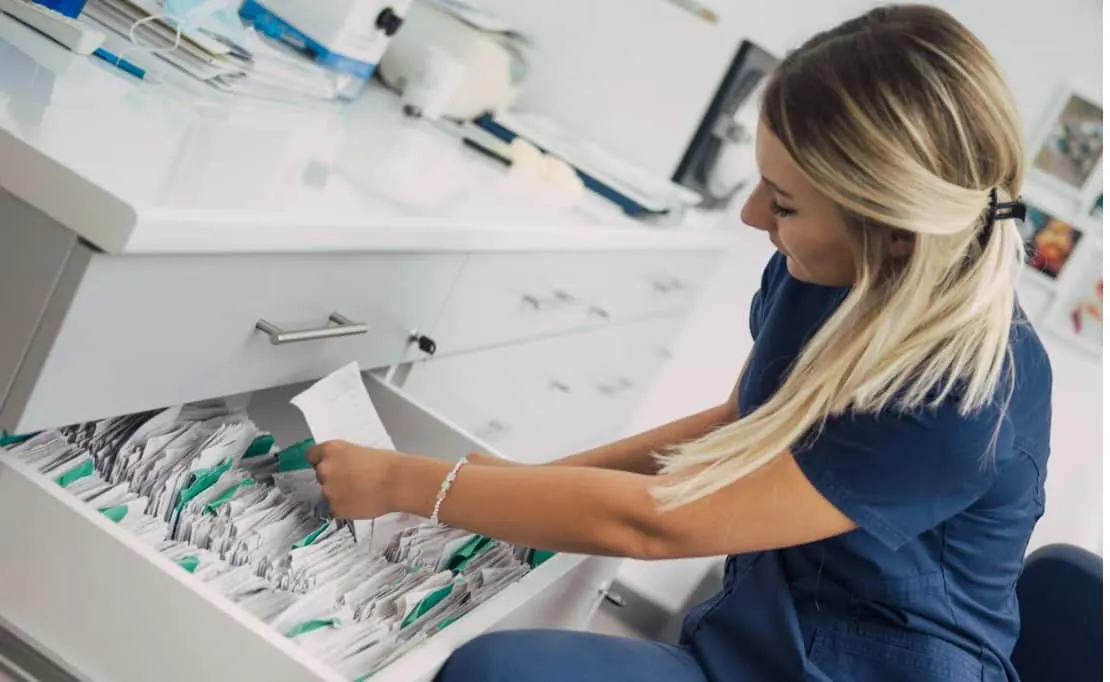
Order early so deliveries and installations don’t delay your opening.
Check out the comprehensive dental equipment checklist here
Step 10: Start Marketing Before You Open
Opening your doors with zero patients is every dentist’s fear, but it doesn’t have to be that way.
The key is marketing your new dental clinic before your official opening date. The earlier people know you’re coming, the better chance you have to start with a full calendar instead of empty chairs.
Below are simple, affordable ways to spread the word in your local area and start building trust before you even treat your first patient:
Build a Website with Online Booking
Your website is your online home; it should be live before you open your doors. Patients will Google you, and if they can’t find your clinic online, they may move on.
Your website should include:
If possible, make online booking easy. People love the convenience of scheduling their appointments. Hire a professional dental website designer for this task so that you can focus on the rest of the things.
Launch Your Practice with a Website That Books Patients 24/7
Let us design a high-converting website that helps you get found, build trust, and fill your appointment calendar.

Claim & Optimize Your Google Business Profile
When someone searches “dentist near me,” Google shows local businesses first. That’s where your Google Business Profile comes in.
Make sure to optimize your Google Business profile :
Launch Social Media Profiles (Facebook & Instagram)
Open business pages on both platforms and begin posting regularly, even before you open. Share:
You can consider hiring a social media manager for this task; otherwise, it will be difficult for you to manage by yourself
Paid Ads: Boost posts or run low-budget ads targeting people within 3–5 miles of your clinic. Even $1–2 per day helps build awareness.
Print Flyers or Postcards and Send Them to Nearby Homes
A well-designed flyer or postcard can help introduce you to nearby households. You can send them out by mail or distribute them through local vendors, bakeries, or coffee shops.
Include:
Offer a Grand Opening Promotion
Nothing gets attention like a great deal. A “Grand Opening Offer” is a perfect excuse to advertise while providing value.
Some ideas:
Make sure the offer is simple, limited-time, and easy to understand.
Give Away Branded Items
People love free stuff, and branded giveaways help your name travel far.
Ideas:
Use them at your clinic, during events, or deliver them to nearby homes and schools.
Ask Friends and Family to Help Spread the Word
Your network is your biggest marketing tool at the beginning. Ask them to:
Step 11: Get Legal: Permits, Licenses, and What You Must Have
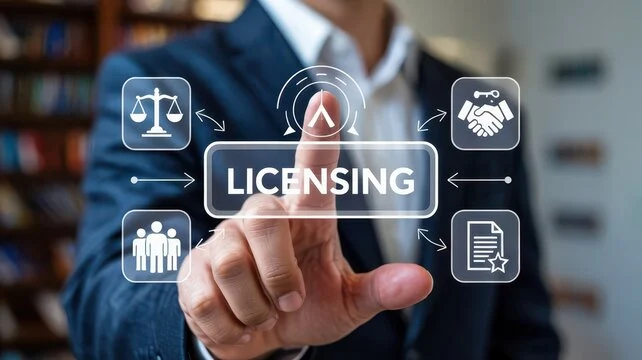
Before opening your dental clinic, you must get all the legal documents and licenses required to operate in your area. This step is very important and should be done before you see your first patient.
Here is a clear breakdown of what you will need and why.
Basic Business Documents
These are general documents that most businesses need:
Dental-Specific Permits and Compliance
As a healthcare provider, you will need some special licenses and must follow safety rules. These include:
- State Dental License
You and any other dentist or hygienist working in your clinic must have a valid dental license in your state. Check with your state dental board to know the requirements. - DEA Registration
If you plan to prescribe medications or controlled substances, you must register with the DEA (Drug Enforcement Administration). - Radiation Permit
If your clinic uses X-ray machines or other equipment that gives off radiation, you may need a radiation safety permit from your state. - OSHA Compliance
Your clinic must follow OSHA safety rules. This includes staff training, handling medical waste properly, and having safety procedures in place. - HIPAA Compliance
You must protect your patients’ personal and health information. HIPAA is the law that tells you how to collect, store, and share patient records safely and legally.
Join Dental and Business Organizations
Joining professional groups can be helpful, especially when starting out.
You can join:
Plan Early and Include It in Your Budget
Getting licenses and permits takes time. Some may take weeks or even months. Make sure to start this process early and keep money aside for fees and costs. Do not leave this until the last minute.
Your Dental Practice Launch Timeline – What to Do & When
Here is a step-by-step timeline to help you stay organized, on track, and stress-free. Each stage helps you build your dream clinic, one step at a time.
10–12 Months Before Opening
This is the planning stage, lay the foundation for your practice.
7–9 Months Before Opening
This is the design and financing phase, and your vision becomes real.
6–7 Months Before Opening
Now you are moving forward, securing the space and beginning construction.
5–6 Months Before Opening
Start working on operations and systems.
4–5 Months Before Opening
Time to focus on your digital presence and essentials.
3 Months Before Opening
This stage is all about setup and getting ready to function.
2 Months Before Opening
You are almost there; now focus on your team and pricing.
1 Month Before Opening
This is your final preparation before launch.
Opening Day – Time to Shine!
How to Run Your Dental Clinic
Once your clinic is open, here is how to keep it running smoothly:
Check out our detailed blog on how to grow your dental practice
Tips From Real Dentists About Starting A Dental Practice
Benefits of Starting Own Dental Practice
DentalPost did a survey of over 13,000 dentists across the country. They looked at how much dentists earn, how many hours they work, and how happy they are with their jobs.
Most dentists, whether they own a clinic or work as employees, work 31 to 40 hours a week. But more clinic owners work longer hours. About 19% of owners work more than 40 hours weekly, compared to 14% of employee dentists.
The big difference is in the money.
According to the 2023–2024 DentalPost Salary Survey, clinic owners earn about $88,000 more each year than dentists who work for someone else. Owners also get raises more often.
Even dentists with less than 5 years of experience earn more if they own a clinic. On average, new owners make $212,000 a year. New associate dentists earn around $139,000.
Final Words
Starting your own dental practice isn’t easy, but it’s worth it. You will be your own boss, help people, and grow something amazing.
We hope that this starting a dental practice checklist would be more than enough for you to kick start
If you need help with your website or marketing, reach out to us. We would love to help you grow.
References

